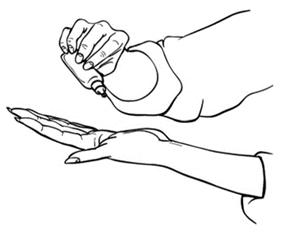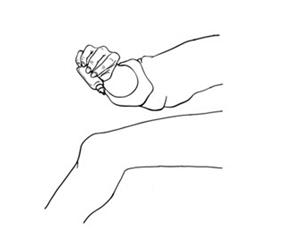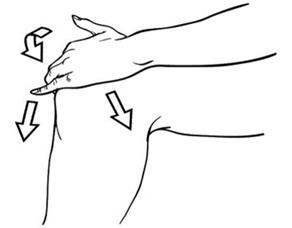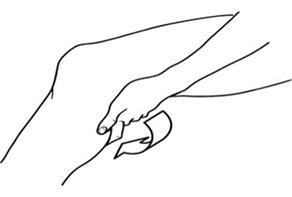PENNSAID- diclofenac sodium liquid
Mallinckrodt, Inc
----------
Medication Guide For
Non-Steroidal Anti-Inflammatory Drugs (NSAIDs)
(See the end of this Medication Guide for a list of prescription NSAID medicines.)
What is the most important information I should know about medicines called Non-Steroidal Anti-Inflammatory Drugs (NSAIDs)?
NSAID medicines may increase the chance of a heart attack or stroke that can lead to death.
This chance increases:
- with longer use of NSAID medicines
- in people who have heart disease
NSAID medicines should never be used right before or after a heart surgery called a “coronary artery bypass graft (CABG).”
NSAID medicines can cause ulcers and bleeding in the stomach and intestines at any time during treatment. Ulcers and bleeding:
- can happen without warning symptoms
- may cause death
The chance of a person getting an ulcer or bleeding increases with:
- taking medicines called “corticosteroids” and “anticoagulants”
- longer use
- smoking
- drinking alcohol
- older age
- having poor health
NSAID medicines should only be used:
- exactly as prescribed
- at the lowest dose possible for your treatment
- for the shortest time needed
What are Non-Steroidal Anti-Inflammatory Drugs (NSAIDs)?
NSAID medicines are used to treat pain and redness, swelling, and heat (inflammation) from medical conditions such as:
- different types of arthritis
- menstrual cramps and other types of short-term pain
Who should not take a Non-Steroidal Anti-Inflammatory Drug (NSAID)?
Do not take an NSAID medicine:
- if you had an asthma attack, hives, or other allergic reaction with aspirin or any other NSAID medicine
- for pain right before or after heart bypass surgery
Tell your healthcare provider:
- about all of your medical conditions.
- about all of the medicines you take. NSAIDs and some other medicines can interact with each other and cause serious side effects. Keep a list of your medicines to show to your healthcare provider and pharmacist.
- if you are pregnant. NSAID medicines should not be used by pregnant women late in their pregnancy.
- if you are breastfeeding. Talk to your doctor.
What are the possible side effects of Non-Steroidal Anti-Inflammatory Drugs (NSAIDs)?
|
Serious side effects include:
|
Other side effects include:
|
Get emergency help right away if you have any of the following symptoms:
- shortness of breath or trouble breathing
- chest pain
- slurred speech
- weakness in one part or side of your body
- swelling of the face or throat
Stop your NSAID medicine and call your healthcare provider right away if you have any of the following symptoms:
- nausea
- more tired or weaker than usual
- itching
- your skin or eyes look yellow
- stomach pain
- flu-like symptoms
- vomit blood
- there is blood in your bowel movement or it is black and sticky like tar
- unusual weight gain
- skin rash or blisters with fever
- swelling of the arms and legs, hands and feet
These are not all the side effects with NSAID medicines. Talk to your healthcare provider or pharmacist for more information about NSAID medicines.
Call your doctor for medical advice about side effects. You may report side effects to FDA at
1-800-FDA-1088.
Other information about Non-Steroidal Anti-Inflammatory Drugs (NSAIDs):
- Aspirin is an NSAID medicine but it does not increase the chance of a heart attack. Aspirin can cause bleeding in the brain, stomach, and intestines. Aspirin can also cause ulcers in the stomach and intestines.
- Some of these NSAID medicines are sold in lower doses without a prescription (over-the-counter). Talk to your healthcare provider before using over-the-counter NSAIDs for more than 10 days.
NSAID medicines that need a prescription
|
Generic Name |
Tradename |
|
Celecoxib |
Celebrex® |
|
Diclofenac |
Flector, Cataflam®, Voltaren®, Arthrotec™ (combined with misoprostol), PENNSAID® |
|
Diflunisal |
Dolobid® |
|
Etodolac |
Lodine®, Lodine® XL |
|
Fenoprofen |
Nalfon®, Nalfon® 200 |
|
Flurbirofen |
Ansaid® |
|
Ibuprofen |
Motrin®, Tab-Profen®, Vicoprofen®* (combined with hydrocodone), Combunox™ (combined with oxycodone) |
|
Indomethacin |
Indocin®, Indocin® SR, Indo-Lemmon™, Indomethagan™ |
|
Ketoprofen |
Oruvail® |
|
Ketorolac |
Toradol® |
|
Mefenamic Acid |
Ponstel® |
|
Meloxicam |
Mobic® |
|
Nabumetone |
Relafen® |
|
Naproxen |
Naprosyn®, Anaprox®, Anaprox® DS, EC-Naproxyn®, Naprelan®, Naprapac® (copackaged with lansoprazole) |
|
Oxaprozin |
Daypro® |
|
Piroxicam |
Feldene® |
|
Sulindac |
Clinoril® |
|
Tolmetin |
Tolectin®, Tolectin DS®, Tolectin® 600 |
*Vicoprofen contains the same dose of ibuprofen as over-the-counter (OTC) NSAID, and is usually used for less than 10 days to treat pain. The OTC NSAID label warns that long term continuous use may increase the risk of heart attack or stroke.
This Medication Guide has been approved by the U.S. Food and Drug Administration.
Instructions for Use
PENNSAID® (pen/sed)
(diclofenac sodium topical solution)
Read the Medication Guide that comes with PENNSAID® first. Be sure that you read, understand and follow these Instructions for Use before you use PENNSAID® for the first time.
Important: For use on the skin only (topical). Do not get PENNSAID® in your eyes, nose or mouth.
Before you use PENNSAID®:
- Apply PENNSAID® exactly as your healthcare provider tells you. Talk with your healthcare provider or pharmacist if you are not sure.
- Only use PENNSAID® to treat pain from osteoarthritis in your knee or knees.
- Apply PENNSAID® on clean, dry skin that does not have any cuts, infections or rashes.
- Use PENNSAID® 4 times each day on your knee or knees as prescribed.
- Your total dose for each knee is 40 drops of PENNSAID®, each time you use it.
- If you get PENNSAID® in your eyes, rinse your eyes right away with water or saline. Call your healthcare provider if your eyes are irritated for more than one hour.
Steps for using PENNSAID®:
Step 1. Wash your hands with soap and water before applying PENNSAID®.
Step 2. Put 10 drops of PENNSAID® either on your hand or directly on your knee (see Figure A).
Figure A

or

Step 3. Spread PENNSAID® evenly on the front, back and sides of your knee (see Figures B
and C). Repeat steps 2 and 3, three times so that your knee is completely covered with a total of 40 drops of PENNSAID®.
Figure B

Figure C

Step 4. If your healthcare provider has prescribed PENNSAID® for both knees, repeat steps 2 and 3 for the other knee.
After you use PENNSAID®:
- Wash your hands with soap and water right away after applying PENNSAID®.
Do not:
- touch the treated knee or allow another person to touch the knee treated with PENNSAID® until your knee is completely dry.
- cover your knee with clothing until your knee is completely dry.
- put sunscreen, insect repellant, lotion, moisturizer, cosmetics, or other topical medicines on your knee until it is completely dry.
- take a shower or a bath for at least 30 minutes after you put PENNSAID® on your knee.
- use heating pads or cover the treated area with bandages where you have applied PENNSAID®.
- use sunlamps and tanning beds. Protect your treated knee from sunlight. Wear clothes that cover your skin if you have to be in sunlight.
How should I store PENNSAID®?
- Store PENNSAID® at room temperature between 68°F to 77°F (20°C to 25°C).
Keep PENNSAID® and all medicines out of the reach of children.
This Instructions for Use has been approved by the U.S. Food and Drug Administration.
Distributed by:
Mallinckrodt Brand Pharmaceuticals, Inc.
Hazelwood, MO 63042 USA
Manufactured by:
Nuvo Manufacturing
Varennes, Quebec, J3X 1P7 Canada
Mallinckrodt, the “M” brand mark and the Mallinckrodt Pharmaceuticals logo are trademarks of a Mallinckrodt company. PENNSAID is a trademark of Nuvo Research Inc. Other brands are trademarks of their respective owners. © 2013 Mallinckrodt.
Issued October 2013
Mallinckrodt™
Pharmaceuticals